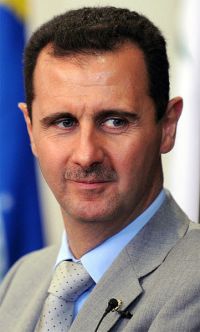2012 World News: Syria

As Casualties Mount, No End in Sight in Syria's Civil War
by Beth Rowen
The situation in Syria deteriorated throughout 2012, with President Bashir Assad refusing to step down or even negotiate with the rebels who began an uprising during 2011's Arab Spring. Civilian casualties mounted as both government troops and rebel fighters increased the brutality of their tactics. By the end of 2012, about 40,000 people, mostly civilians, had been killed in the war and some 500,000 people declared themselves refugees. Diplomacy Fails to Stop the War from EscalatingArab League observers entered Syria in January to try to persuade Assad to stop attacking civilians, withdraw tanks from towns, and begin talks with the opposition. Despite their presence and the defection of thousands of soldiers, the killing continued and Assad showed no signs of backing down. In March, the UN introduced a peace plan, drafted by special envoy to Syria and former UN Secretary-General Kofi Annan, that called on the government to stop killing civilians, engage in talks with the opposition, withdraw forces from the streets, and "begin a transition to a democratic, political system." Russia and China had previously vetoed resolutions condemning Assad, now endorsed the document. Assad accepted the statement and agreed to a cease-fire, but many observers were skeptical that he would make good on his promises. Assad never observed the cease-fire; if anything he intensified his attacks on the opposition and civilians. Annan resigned as UN special envoy to Syria in August, citing the Syrian government's refusal to implement his peace plan, intensifying violence by rebels, and discord within the Security Council. He said "without serious, purposeful and united international pressure, including from the powers of the region, it is impossible for me, or anyone, to compel the Syrian government in the first place, and also the opposition, to take the steps necessary to begin a political process." While the opposition put up a dogged fight against a military many times its size in both numbers and might, it lacked unity and leadership. In addition, Muslim jihadists and members of Al Qaeda began to join the fight in the summer, backing the rebels with weapons and financing. The development prompted concern that the opposition would become dominated by extremists. The opposition also began to lose support within Syria and in the international community as its attacks grew increasingly brutal and gratuitous. As the war dragged on and threatened the stability of the entire region, several international leaders, including U.S. secretary of state Hillary Clinton, persuaded the opposition to unite. In November they did, forming a new governing body called the Syrian National Initiative. The new organization is made up of younger leaders and has strong representation inside the country. It will also oversee the opposition's military and will manage the distribution of weapons and funds. The group's leader, Sheikh Ahmad Moaz al-Khatib, said he hoped the new body would be viewed with legitimacy and receive financial assistance and weapons from the international community. France, Great Britain, and Turkey were the first countries to recognize the organization. The U.S. gave its imprimatur in December. While most nations have refrained from sending troops to back the opposition, several, including the U.S. have sent financial and humanitarian aid. Amid growing concern that Assad was preparing to unleash chemical weapons on the opposition, President Barack Obama said he would not allow such a move. The military started to show signs of weakening in November and into December. The opposition began using surface-to-air missiles to shoot down military planes and had taken over important military bases, while the military started to fire Scud missiles at the rebel fighters. Nevertheless, Assad dug in his heels and refused to budge. Some analysts speculated that he had few—if any—options for survival. If he fled or stepped down, his own followers might turn on him as a traitor, and by remaining in power he risked being killed by rebel fighters. |
- More from 2012 News of the World









